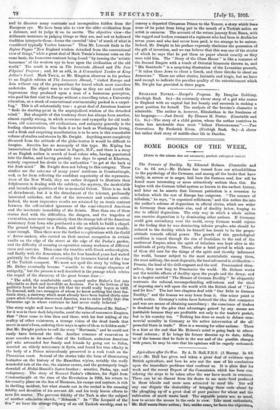SOME BOOKS OF THE WEEK.
ilvetiee in this cottons does not necessarily preclals stskepts:st retrie.0:1 The Nemesis of Docility. By Edmond Holmes. (Constable and Co. 4s. 6d. net.)—Mr. Holmes has turned from our schoolchildren to the psychology of the Germans, and among all the books that have lately, in sorrow or in anger, laid bare the German soul, few will be found more interesting or more attractively written than this. He begins with the German tribal system as known to the earliest history, and later on he asserts that German patriotism is a reversion to tribalism which the rest of Europe has outgrown. " The essence of tribalism," he says, " is organized selfishness," and this notion fits into the author's scheme of dogmatism in official circles, which are wider in Germany than anywhere else, and of docility below, longing to rise to official dogmatism. The only way in which a whole nation can exercise dogmatism is by dominating other nations. If Germany could gain ascendancy over the world, every German would rejoice in the feeling that he was dominating inferior peoples, who should bo reduced to the docility which he himself has learnt to bo the proper attitude towards official power. The growth of this pyschological condition is traced through the rise of feudalism to the end of the mediaeval Empire, when the spirit of tribalism was kept alive in the multitude of petty States. Those, after a brief period in which some of them did care for the things of the spirit and thereby influenced the world, became subject to the most materialistic among them, the most military, the most dogmatic, the least- advanced in civilization-- Prussia, the land of the drill-sergeant and the serf. Prussianized them- • selves, they now long to Prussianize tho world. Mr. Holmes works out the terrible effects of docility upon the people and the Army, and in a chapter entitled:" The Menace of German Docility" he elOquently contrasts the colossal, uncomprehending self-esteem and the ideal of imposing one's will upon tho world with the British ideal of " Live and lot live." The last two chapters deal with " Our Debt to German Docility," and the lessons we may learn from it. One minor point is worth notice. Germany's rulers have fostered the idea that commerce and war are means of obtaining ascendancy : the conscience of traders is deadened by the ,plea that advantages gained by any means are justifiable because they are profitable not only to the trader's pocket, 'but to his country too. " Nothing has done so much to debase corn. martial morality in Germany as the active intervention of the all- powerful State in trade." Here is a warning for other nations. 'There is a hint at the end that Mr. Holmes's mind. is going back to educa- tional reforms ; if he brings his former theories up to date, telling 'us of the lessons that he finds in the war and of the possible changes with peace, he may be sure that his opinions will be eagerly welcomed.






























 Previous page
Previous page